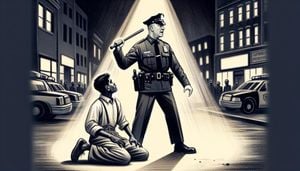Tucker Carlson, the former Fox News host known for his controversial opinions, ignited outrage recently with bizarre claims linking abortion to hurricanes. Carlson made his inflammatory assertions during an interview on Steve Bannon’s War Room podcast, which aired just before the pivotal 2024 U.S. presidential elections. He dismissed scientific arguments connecting climate change to the increasing intensity of hurricanes, instead proposing, "it’s probably abortion, actually," as the root cause of these natural disasters.
This assertion follows closely behind two significant hurricanes, Helene and Milton, which devastated parts of the U.S. southeast, raising concerns among scientists about climate change's role. Research suggests climate change has been amplifying the severity of such weather events, resulting in heightened rainfall and increased storm surges. Nevertheless, Carlson’s comments disregarded accepted scientific reasoning, framing the discussion instead through the lens of moral and religious condemnation.
Diving deep and delivering what could be described as his signature inflammatory rhetoric, Carlson characterized supporters of abortion rights as "evil," drawing parallels to historical practices of human sacrifice for power or freedom. His remarks hinted at broader cultural critiques and were wrapped in alarming Christian imagery, aiming to position abortion as akin to ancient sacrificial rituals. He stated, "You can’t participate in human sacrifice without consequences," evoking vivid historical references and rhetoric aimed at provoking fear and outrage.
Many were shocked at Carlson’s attempt to connect the dots between policy discussions related to women’s reproductive rights and the uncontrollable force of nature represented by hurricanes. Critics have pointed out the dangerous precedent this sets, trivializing both scientific discourse and the very real discussions surrounding climate change, which has broad agreement among the scientific community.
The intersection of media, politics, and public opinion plays a pivotal role here. Carlson, seen as aligning closely with former President Donald Trump, has consistently reiterated themes prominent within the Trump campaign—a blend of populism, cultural grievances, and sensationalist narratives. His remarks about hurricanes echo sentiments expressed by some religious leaders who have previously attributed natural disasters to societal sins, including abortion.
This isn’t the first time Carlson has exploded onto the media stage with incendiary claims. Previously, he has made headlines by labeling policy decisions, public figures, and various scientific findings through wildly exaggerated subjective lenses. Carlson’s blend of entertainment, shock value, and political commentary continues to attract both fervent supporters and staunch detractors.
During his Monday podcast appearance, Carlson pointed to comments made by Janet Yellen, the Secretary of the Treasury, during past hearings as evidence of the perceived immorality surrounding the abortion discussion, distorting Yellen’s argument about economic and societal impact. Carlson twisted her critique of abortion bans, claiming it implied, “you can do your part to help the American economy by killing your child.” Such rhetorical flourishes serve to inflame public sentiment and fuel divisive narratives surrounding reproductive rights.
Many conservatives, including Carlson, have leveraged this rhetoric as part of their electoral strategy as November elections loom ever closer. This proximity to the elections adds weight to his claims, as both sides engage heavily with the issues of the day, particularly around policy impacts, morality, and the foundational beliefs guiding political discourse.
The hazard of Carlson’s theories lies not just in their entertainment but also their potential influence over public perception and voter behavior. His audacious claims have reignited similar sentiments evoked from previous elections, where natural disasters and social issues have been entwined within campaign narratives to galvanize voter bases, drive engagement, and politically mobilize audiences across many platforms.
Further complicity arises from the echo chamber of social media, where such sensational claims gain traction, enabling narratives to ripple beyond the podcast’s listener base. With millions tuning in to prominent conservative media channels, messages espousing outrageous claims can gain legitimacy, leading to real-world consequences, reinforcing fears, and shaping public opinion about public policy matters.
This bizarre conspiracy theory serves as yet another chapter reflecting the convergence of politics and spectacle. Carlson’s podcast appearances and commentary styles highlight how mainstream political figures can exploit sensational narratives to bolster their conversations around contentious social issues, underscoring the role of media personalities as both commentators and influencers within the current political climate.
The discourse surrounding Carlson's latest statements reinforces the imperative for media literacy and the importance of distinguishing between entertainment and substantive reporting. Engaging critically with media content is increasingly necessary as society navigates the collision course of media representation, scientific discourse, and political narratives.
Given the stakes and the growing threats associated with climate change and related disasters, Carlson’s rhetoric not only stirs controversy but demands serious discourse about the future of ethical journalism, trust in science, and the role of media figures as they articulate their beliefs to substantial audiences. The aftermath of Carlson’s statements will likely influence conversations around both climate and reproductive rights for years to come.
With headlines swirling and the potential fallout of his claims still undisclosed, the broader discussion will inevitably center on how such statements intersect with the political initiatives of the day, influencing both voter sentiment and public policy discussions. The connection he draws between moral responsibility and climate events raises questions about accountability, ethics, and the responsibilities of those who engage in public discourse.
Whether viewed through the lens of shock value, religious morality, or political strategy, Tucker Carlson’s claims about abortion and hurricanes are symptomatic of larger societal debates. They encapsulate the usual interplay between media, culture, and politics, showing how narratives are shaped by individual voices on national platforms. The onus now lies upon both public and media participants to dissect these complex issues thoughtfully and engage with the multi-layered narratives surrounding them.



